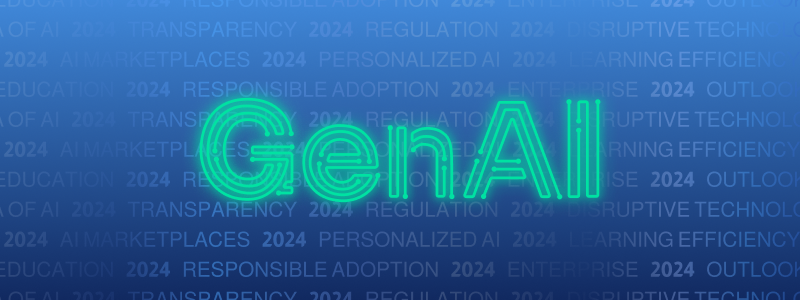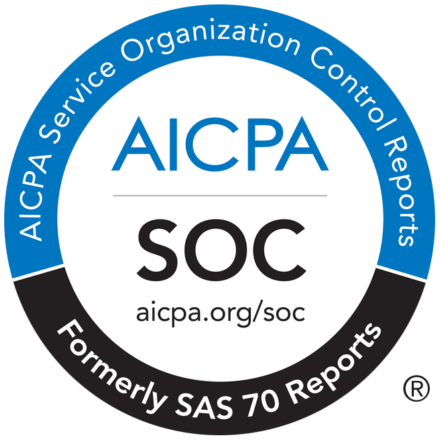After genAI burst onto the scene at the end of 2022, enterprises, educational institutions, and the general public spent most of 2023 trying to determine what to do with AI and where it belongs in workflows, classrooms, and day-to-day living. Some outright banned it, while others dove headfirst into adopting the technology, often to mixed results.
Now, at the dawn of 2024, the hesitation around genAI is subsiding as views shift to exploring the opportunities to improve efficiencies, streamline processes, and enhance the learning journey.
Here is our outlook for the future of AI in the new year.
GenAI and Education
Arguably, education was the industry most heavily impacted by genAI. Maybe not necessarily by the technology itself, but instead around the opportunities and risks of the technology and figuring out where it fits into the learning journey. Educational institutions across the globe were assessing if it was considered cheating if students used AI models for assignments. Did it compromise their learning of critical thinking skills? Was it original work?
In 2024, something we see happening in education is a shift toward utilizing AI for specialized study aids and writing assistants tailored to specific academic fields and tests that will improve student learning efficiency. Educators will benefit from more specialized AI models that can help them streamline their workflow and give them more time to be present in the classroom.
The collaboration between educators and students around AI has already begun but will most likely be expanded upon this year. Communication will be essential for responsible AI adoption within education. Instead of outright banning the use of AI, most educators accept that it’s here to stay and know that it’s crucial to embrace the technology and have open discussions with their students about how to use it properly as a tool to enhance their learning experience and not hinder it.
Additionally, it will be pivotal for educational institutions to establish rules and guidelines around when AI use is allowed and when it is not and to share those guidelines with students from the beginning.
GenAI and Enterprise
Enterprise began the adoption of generative AI in 2023 but, as a result, quickly learned about the unforeseen risks.
Never was this more evident than in early 2023 when a developer at Samsung unknowingly uploaded proprietary data into the OpenAI repository while using ChatGPT. As a result, that proprietary data became public. Understandably, the immediate result was an outright ban on AI use within Samsung, with additional corporations following suit shortly after that.
Additional concerns arose around copyright infringement, especially regarding AI-generated source code. Because AI models have no sense of right or wrong, nor are they aware of licensing, they often pull pieces of code and text from their vast databases that can often have strict licensing agreements attached that the end user isn’t aware of. A Copyleaks analysis report further exposes the risk of AI plagiarism, showing that nearly 60% of text generated by GPT-3.5, the most widely used model, contained some form of plagiarized content.
Since then, offerings like the GenAI Governance and Compliance suite have arrived to ensure responsible generative AI adoption across organizations. With these products, organizations can establish and enforce policies around generative AI use, conduct audits, restrict specific keyword usage, and more to help mitigate the risk of security and data breaches.
As a result of more governance solutions in place, we expect to see AI adoption expand rapidly across the enterprise.
For starters, industry-specific models will be created on open platforms that promise to enhance everything from financial analysis to medical research and computer programming. Additionally, broader access to developing highly specialized AI will lead to more sophisticated and accurate language models overall in 2024.
Tailored models focusing on specific tasks or knowledge areas can reduce generic information gaps and hallucinations that have plagued chatbots like ChatGPT. They also create venues to incorporate critical context through focused datasets and human-in-the-loop training.
GenAI Moving Forward
2024 is going to be the next chapter of generative AI. In 2023, we watched as the world tried to navigate AI, whereas, by the end of 2024, we can expect almost everyone to have some form of personalized AI, whether on their phone or as part of their search engine.
Following the recent launch of OpenAI’s GPT Store, we will likely see a proliferation of AI marketplaces in 2024. These platforms allow anyone to efficiently build, share, and access AI models tailored to specific industries or use cases beyond generic chatbots.
Companies like Google, Microsoft, and Meta will continue embedding tailored AI directly into their products and services, resulting in higher AI adoption among the general public. This widespread diffusion will help the AI industry mature and distinguish front-runners from short-lived players.
“Over the last year, AI technology has become increasingly more sophisticated, and it has become even more crucial to keep tabs on the exposures and implications of using GenAI. It seemed every week there was a new risk exposed or the technology advanced even further, and once again, everyone was playing catch up,” says Alon Yamin, CEO and Co-founder of Copyleaks. “November 30, 2023, marked the first anniversary of ChatGPT. In that time, it has been an indisputable disruptive technology. In 2024, we’re entering a new era of AI, and we will also see what organizations will pull ahead as the leaders on the innovation front and who will fade out like Blackberries in the wake of the iPhone. This next year will be interesting, to say the very least.”
But as with any disruptive technology, even as it advances, the need for responsible adoption and governance continues to be a need. As AI expands into our day-to-day lives, regulation will be critical to mitigating risk and adding much-needed transparency. Expect to see government regulation and organizational governance begin to catch up to AI capabilities in 2024 to align innovation with public interests.
With the emergence of specialized AI, the general public, enterprises, and those within the walls of education will begin adopting AI models, promising to enhance capabilities and change our world like never before in 2024 and beyond.


